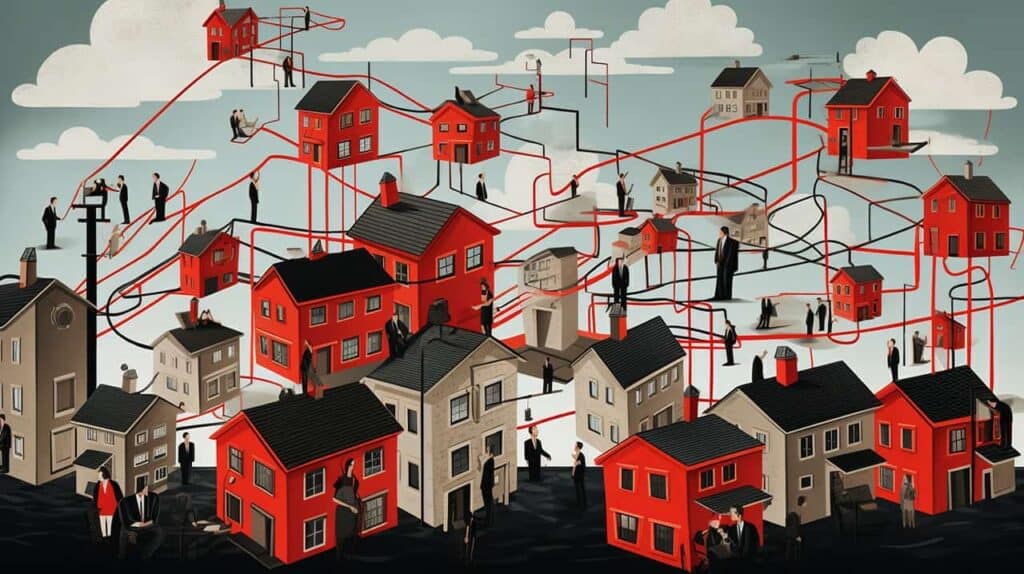As a homeowner who recently sold my house, I questioned the value of real estate agents in today’s digital age. With an abundance of online information, it seemed anyone could navigate the market alone.
However, upon delving deeper, I discovered the crucial role agents still play. In this article, we’ll explore their traditional responsibilities, the impact of the internet, changes in their role, and the ongoing debate about their necessity.
Join me as we examine whether real estate agents are truly indispensable or just an outdated relic.
Key Takeaways
Realtor fees and commissions in the GTA market amount to a significant portion of the total GDP of Canada, indicating the substantial amount of money realtors make.
The job of a realtor has minimal requirements and lacks barriers to entry, leading to potential inefficiencies and unethical practices.
Collusion and pricing wars among realtors can drive up house prices unnecessarily, contributing to the inefficiency and unfairness of the real estate industry.
Disruptive technology has the potential to revolutionize the real estate industry, bringing transparency and efficiency and potentially eliminating the need for realtors.
Table of Contents
The High Costs of Realtor Fees and Commissions

I can’t help but feel frustrated by the high costs of realtor fees and commissions.
The economic impact of these fees is staggering, with realtors in the GTA market alone making almost 16 billion dollars last year, contributing to 1% of the total GDP of Canada.
This raises concerns about inequality, as realtors receive 3-4% on houses that easily go for 1-2 million dollars, while the average person makes what realtors earn in just 1-2 weeks.
It’s hard to justify these high fees when the value of expertise provided by realtors is questionable. Many of the tasks they perform can be done by individuals with minimal requirements and barriers to entry into the industry.
This lack of requirements leads to inefficiency in the market and potential unethical practices.
However, there are alternatives to traditional agents that can empower consumers. Disruptive technology has the potential to revolutionize the real estate industry, bringing transparency and efficiency and eliminating the need for realtors.
Embracing these changes and exploring alternative options can lead to a more fair and consumer-empowered real estate market.
Minimal Requirements and Barriers to Entry in the Real Estate Industry

As a potential homebuyer, I find it concerning that the real estate industry has such minimal requirements and lacks any barriers to entry. This lack of qualifications and entry requirements contributes to unethical practices, market inefficiency, and a lack of industry standards.
- Real estate agent qualifications: The job of a realtor has very minimal requirements, making it easy for anyone to become a realtor. This low barrier to entry leads to a lack of expertise and knowledge among real estate agents.
- Unethical practices: The absence of requirements allows for potential unethical practices among realtors. Some agents may engage in collusion with other realtors to squeeze money out of buyers, leading to pricing wars and driving up house prices unnecessarily.
- Market inefficiency: The real estate industry is in need of more stringent qualifications and standards to improve market efficiency. Without proper qualifications, realtors may lack the necessary skills to effectively serve buyers and sellers.
- Industry standards: The current lack of requirements and barriers to entry in the real estate industry contribute to a lack of industry standards. This can lead to inconsistencies in the quality of service provided by real estate agents.
To address these issues, it’s crucial to establish stricter qualifications and entry requirements for real estate agents. This will help ensure that only qualified and ethical professionals enter the industry, promoting market efficiency and providing a higher level of service to homebuyers and sellers.
Collusion and Pricing Wars Among Realtors

I’ve witnessed firsthand the detrimental effects of collusion and pricing wars among realtors as they contribute to market inefficiency and unfairness.
Collusion among realtors occurs when they collaborate to squeeze money out of buyers while pricing wars drive up house prices unnecessarily. These practices not only harm buyers but also contribute to the overall inefficiency and unfairness of the real estate industry.
To prevent collusion and pricing wars, measures should be taken to promote transparency and fair competition in the market.
One example of realtor collusion is when agents on both sides of a transaction agree to artificially inflate the price of a property, resulting in the buyer paying more than the fair market value. This not only disadvantages the buyer but also distorts the market and undermines its integrity. Another example is when realtors agree to fix their commission rates, limiting the choices available to buyers and sellers and preventing fair competition.
The negative impact of pricing wars is evident in the inflated prices of houses. When realtors engage in aggressive bidding and price escalation tactics, it artificially inflates the value of properties, making them unaffordable for many buyers. This creates an unfair advantage for sellers and further exacerbates the housing affordability crisis.
To prevent collusion and pricing wars, regulatory bodies should enforce stricter regulations and penalties for unethical behavior. Additionally, promoting competition and transparency in the industry through the use of technology and online platforms can help prevent collusion and ensure a fair and efficient real estate market.
A Comparison of the Real Estate Industry to Other Inefficient Industries

The real estate industry, like the trucking industry in Canada, is often criticized for its inefficiencies and low standards. Both industries have been accused of engaging in cartel-like practices and unethical behaviors. There’s a pressing need for stricter qualifications and standards in the real estate industry to ensure fair and ethical practices.
Comparison to the trucking industry: The real estate industry is often compared to the trucking industry in Canada due to its shared inefficiencies and low standards. Both industries are criticized for their lack of transparency and unfair practices.
Cartel-like practices: Many realtors tend to collaborate with each other, forming a cartel-like environment. This collaboration can lead to pricing wars and drive up housing prices unnecessarily.
Need for stricter qualifications: The job of a realtor has minimal requirements and no barriers to entry, allowing anyone to become a realtor. This lack of qualifications contributes to the inefficiencies of the market and potential unethical practices.
Unethical practices: The absence of requirements in the real estate industry opens the door for unethical practices among realtors. Measures should be taken to prevent collusion and ensure ethical behavior.
To address these issues, disruptive technology has the potential to revolutionize the real estate industry. By introducing new technologies, the industry can become more transparent and efficient. The hope is that disruptive technology will eliminate the inefficiencies and unethical practices that currently plague the industry.
It’s crucial for the real estate industry to adapt to these changes and embrace technological advancements to create a more fair and efficient market.
The Potential Impact of Disruptive Technology on the Future of Real Estate Agents
Disruptive technology has the potential to significantly reshape the role of real estate agents in the future. The impact of automation and the role of AI in the real estate industry can’t be ignored. Advancements in technology have brought about many advantages, such as increased efficiency and access to information. These changes have the potential to disrupt the traditional ways of doing business in real estate.
Automation and AI can streamline processes and eliminate the need for certain tasks that real estate agents currently handle. For example, AI-powered algorithms can analyze market data, provide accurate property valuations, and even match buyers with suitable properties. This can save time and reduce the reliance on agents for these functions.
Furthermore, technology has made it easier for buyers and sellers to connect directly, bypassing the need for an intermediary. Online platforms and marketplaces allow individuals to list and search for properties, negotiate deals, and even complete transactions without the involvement of a real estate agent.
While some may argue that this technological disruption threatens the future of real estate agents, it’s important to recognize that their role may evolve rather than disappear entirely. Agents can adapt and embrace technology to enhance their services and provide added value to clients. They can focus on building relationships, providing expert advice, and offering personalized guidance throughout the home buying or selling process.
Frequently Asked Questions
What Are the Traditional Responsibilities of Real Estate Agents?
The traditional responsibilities of real estate agents include property marketing, client representation, market analysis, contract negotiation, and property pricing. They play a crucial role in guiding buyers and sellers through the complex process of buying or selling a property.
How Has the Internet Affected the Real Estate Industry?
Online listings and virtual tours have revolutionized the real estate industry. They provide convenience and accessibility for buyers while also enhancing data accuracy and online marketing. These advancements have influenced buyer behavior and transformed the way properties are bought and sold.
How Has the Role of Real Estate Agents Changed in Recent Years?
The role of real estate agents has evolved due to technological advancements and changing consumer behavior. Online listing platforms have impacted the industry, forcing agents to adapt their marketing tactics and take on a more dynamic and personalized role in assisting buyers and sellers.
What Is the Role of Real Estate Agents in Negotiations?
In negotiations, real estate agents play a crucial role in communication, building trust, and implementing effective strategies. They understand market trends and work to maximize value for their clients.
Do Real Estate Agents Play a Role in Financing?
Real estate agents play a crucial role in financing, providing guidance and expertise on mortgages and loans. They assist in navigating the complex process, offering valuable advice and helping borrowers find suitable financing options.
Conclusion
In conclusion, while there may be debates about the necessity of real estate agents in today’s digital age, it’s evident that they still play a crucial role in the industry.
Their expertise, knowledge, and guidance are invaluable when navigating the complexities of buying or selling a property.
The internet may have made information more accessible, but it can’t replace the personalized advice and support that real estate agents provide.
So, before dismissing their value, consider the peace of mind and expertise they can bring to your real estate journey.

